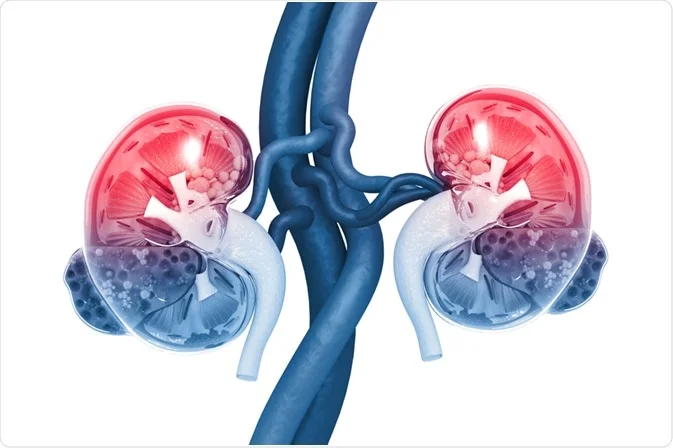Glomerular diseases
Home / Glomerular diseases
Glomerular diseases
Glomerular diseases refer to a group of conditions that affect the glomeruli, the tiny filtering units in the kidneys responsible for removing waste and excess substances from the blood. When the glomeruli are damaged, it can lead to impaired kidney function, protein or blood leakage into urine, and potentially, chronic kidney disease (CKD) or kidney failure. These diseases can be primary (originating in the kidneys) or secondary (due to systemic diseases).

a. Primary Glomerular Diseases (directly affecting the kidneys):
-
Glomerulonephritis:
Inflammation of the glomeruli caused by infections, autoimmune diseases, or unknown triggers. -
Acute Glomerulonephritis:
A sudden onset of glomerular inflammation often due to infections like strep throat. -
Chronic Glomerulonephritis:
A slow, progressive form that can lead to permanent kidney damage over time. -
Focal Segmental Glomerulosclerosis (FSGS):
A condition where some parts of the glomeruli become scarred, reducing kidney function. -
Minimal Change Disease (MCD):
A disease where the glomeruli appear normal under a microscope, but protein leaks into the urine. It's common in children and causes nephrotic syndrome. -
Membranous Nephropathy:
A thickening of the glomerular membrane that leads to proteinuria and often causes nephrotic syndrome.
b. Secondary Glomerular Diseases (due to systemic diseases or external factors):
1 . Types of Glomerular Diseases:
-
Diabetic Nephropathy:
Caused by long-standing diabetes, this condition damages the glomeruli, leading to CKD. -
Lupus Nephritis:
A complication of systemic lupus erythematosus (SLE), where the immune system attacks the kidneys. -
IgA Nephropathy (Berger's Disease):
A condition in which IgA (a type of antibody) builds up in the glomeruli, leading to inflammation and kidney damage. -
Post-Infectious Glomerulonephritis:
Inflammation that occurs after an infection, often following strep throat or other bacterial infections.
2 . Symptoms
Symptoms of glomerular diseases vary depending on the underlying cause and severity but often include:
- Proteinuria (excessive protein in the urine), which may cause foamy urine.
- Hematuria (blood in the urine), which can give the urine a pink or cola-like color.
- Edema (swelling), especially in the face, hands, feet, and abdomen, due to fluid retention.
- Hypertension (high blood pressure), often due to impaired kidney function.
- Reduced urine output or dark-colored urine in severe cases.
- Fatigue or general malaise, due to waste buildup in the body from poor kidney function.
3 . Diagnosis
- Urine tests to detect proteinuria, hematuria, or abnormal substances.
- Blood tests to assess kidney function, including levels of creatinine and blood urea nitrogen (BUN).
- Kidney biopsy, where a small tissue sample is taken from the kidney to examine the extent of damage to the glomeruli under a microscope.
- Imaging tests such as ultrasound to check for structural abnormalities in the kidneys.
4. Complications:
If not managed properly, glomerular diseases can lead to:
- Chronic Kidney Disease (CKD): Damage to the glomeruli can progressively worsen, leading to CKD and, eventually, end-stage kidney disease (ESKD).
- Nephrotic Syndrome: A collection of symptoms including severe proteinuria, low blood protein levels, high cholesterol, and swelling (edema).
- Acute Kidney Injury (AKI): In some cases, glomerular diseases can cause a sudden and severe decline in kidney function.
- Hypertension and Cardiovascular Disease: Damaged kidneys often lead to high blood pressure, which increases the risk of heart disease and stroke.
5. Treatment:
Treatment depends on the specific type and cause of glomerular disease but often includes:
-
Medications:
- ACE inhibitors or ARBs to lower blood pressure and reduce proteinuria.
- Immunosuppressants such as steroids (e.g., prednisone) or more potent drugs (e.g., cyclophosphamide, rituximab) in immune-mediated glomerular diseases.
- Diuretics to manage fluid retention and swelling.
- Statins to manage high cholesterol, especially in cases of nephrotic syndrome.
-
Lifestyle changes:
- Dietary modifications, such as reducing salt intake, managing protein intake, and controlling blood sugar levels (in diabetic nephropathy).
- Regular exercise and maintaining a healthy weight to support cardiovascular health.
- Dialysis or kidney transplantation in advanced cases of CKD or end-stage kidney disease.
6. Prognosis:
- The outlook for individuals with glomerular disease varies widely. Some conditions, like minimal change disease, respond well to treatment and often lead to full recovery.
- Others, like FSGS or diabetic nephropathy, may lead to progressive kidney failure, requiring lifelong management or kidney replacement therapy (dialysis or transplant).
- Early diagnosis and aggressive management of the underlying cause are key to slowing or halting the progression of glomerular diseases and preventing complications.
Conclusion:
Glomerular diseases are a diverse group of kidney conditions that, if left untreated, can result in serious complications like chronic kidney disease or end-stage kidney failure. Early detection, careful monitoring, and tailored treatments are essential to managing these diseases effectively.
Book An Appointment
Other services
- Diabetes
- Hypertension
- Febrile illness
- Glomerular disease
- Liver and gastrointestinal diseases
- Anemia
- Pediatric kidney disease
- Tubular disorders
- Chronic kidney disease
- Acute kidney injury
- Urinary tract infection and stone
- Renal transplant work up
- Respiratory disorders
